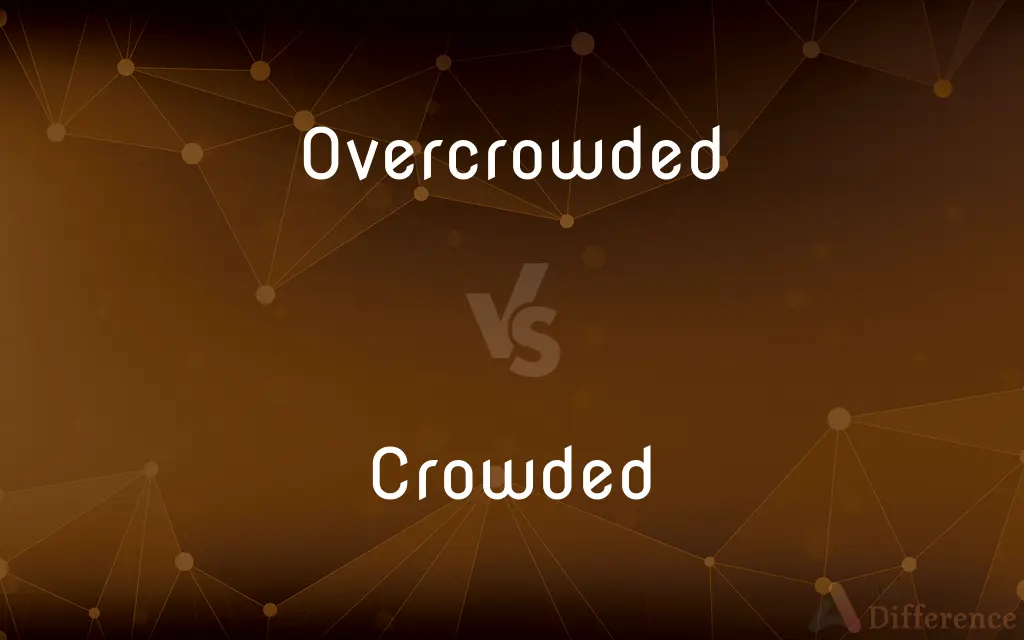Overcrowded vs. Crowded — What's the Difference?
By Urooj Arif & Fiza Rafique — Updated on April 8, 2024
Overcrowded implies excessive crowding beyond capacity, while crowded describes a place filled to its limits but not necessarily over them.

Difference Between Overcrowded and Crowded
Table of Contents
ADVERTISEMENT
Key Differences
Overcrowded situations denote an extreme level of crowding where the number of people or items far exceeds the capacity or comfortable space available, often leading to discomfort and inefficiency. On the other hand, crowded refers to a space that is fully occupied but not to the point of severe discomfort or functionality loss.
While overcrowded conditions can result in significant negative effects on health, safety, and overall well-being due to the excessive numbers, crowded places might still maintain a level of order and safety, albeit with reduced personal space and comfort.
The term "overcrowded" is often used to describe situations or environments where the density of population or objects has reached a point that causes operational issues, such as in public transport, housing, or public events. Whereas "crowded" might simply imply a high presence of people or objects, suggesting popularity or high demand without the critical connotations.
In discussions about living conditions, "overcrowded" housing can indicate a severe lack of space per person, potentially violating health and safety standards. Conversely, a "crowded" living space might just mean that it is fully utilized, with inhabitants experiencing minimal to moderate inconvenience.
The perception of overcrowded vs. crowded can also vary depending on personal tolerance and cultural norms. What is considered overcrowded in one context or culture may be seen as merely crowded or even normal in another, highlighting the subjective nature of these terms.
ADVERTISEMENT
Comparison Chart
Definition
Exceeding the capacity or comfortable space available
Fully occupied but within capacity
Implications
Severe discomfort, health, and safety risks
Reduced comfort and personal space
Usage Context
Often negative, indicating problems or hazards
Neutral or positive, indicating popularity
Examples
Overcrowded trains, housing
Crowded markets, concerts
Cultural Perception
May vary greatly, generally seen negatively
Subjective, can be positive depending on context
Compare with Definitions
Overcrowded
Health and safety risks.
Overcrowded living conditions are a major health concern in urban areas.
Crowded
Minimal to moderate inconvenience.
The crowded bus during peak hours is a daily reality for commuters.
Overcrowded
Negative implications.
Overcrowded schools struggle to provide adequate education.
Crowded
Moderate discomfort.
The crowded room was warm but manageable during the event.
Overcrowded
Severe discomfort.
Overcrowded conditions in the train made the journey unbearable.
Crowded
Maintained order and safety.
Despite being crowded, the concert was enjoyable and safe.
Overcrowded
Excess capacity.
The room became overcrowded when double the intended guests arrived.
Crowded
Full capacity.
The crowded cafe buzzed with the morning rush of coffee enthusiasts.
Overcrowded
Operational issues.
The overcrowded festival faced severe logistical problems.
Crowded
High presence suggesting popularity.
The crowded beach indicated its popularity among tourists.
Overcrowded
To cause to be excessively crowded
A system of consolidation that only overcrowded the classrooms.
Crowded
(of a space) full of people, leaving little or no room for movement; packed
A very crowded room
The crowded streets of Southwark
Overcrowded
To crowd together excessively.
Crowded
Filled near or to capacity
A crowded bus.
Overcrowded
Simple past tense and past participle of overcrowd
Crowded
Filled with a crowd
A crowded plaza.
Overcrowded
Containing too many occupants for an area of its size.
Crowded
Having insufficient space for comfort
“When wealthy Dutch settlers began feeling crowded in lower Manhattan, they moved to verdant farmlands north of the city” (Janet Groene).
Crowded
Containing too many of something; teeming.
Crowded
Simple past tense and past participle of crowd
Crowded
Overfilled or compacted or concentrated; filled to excess; as, a crowded program. Opposite of uncrowded.
Crowded
Filled with a crowd; as, a crowded marketplace.
Crowded
Having an uncomfortable density of people; filled to excess with people; as, crowded trains; a crowded theater.
Crowded
Overfilled or compacted or concentrated;
A crowded theater
A crowded program
Crowded trains
A young mother's crowded days
Common Curiosities
How is overcrowding measured?
Overcrowding is often measured by comparing the number of people present to the available space, ensuring health and safety standards are met.
What is the main difference between overcrowded and crowded?
Overcrowded implies conditions beyond capacity causing significant discomfort, whereas crowded describes a full but manageable space.
Can a place be both overcrowded and crowded?
The terms are related but represent different degrees of fullness; a place transitions from crowded to overcrowded as conditions worsen.
Can overcrowded situations lead to operational issues?
Yes, excessive overcrowding can cause logistical, health, and safety problems, affecting functionality.
How do overcrowded conditions affect health?
Overcrowded conditions can lead to increased stress, spread of diseases, and overall decline in well-being.
Can technology help manage overcrowded situations?
Yes, technology like crowd management systems and real-time monitoring can improve safety and efficiency.
Why might some places be intentionally crowded but not overcrowded?
Some spaces, like concerts or bars, are designed to be crowded to create an atmosphere of popularity and energy, ensuring safety and comfort.
Are overcrowded conditions always negative?
While generally seen as negative due to associated risks, some may tolerate or not perceive overcrowding negatively depending on the context.
Does cultural perception affect the definition of overcrowded?
Yes, cultural norms and personal tolerance levels can influence what is considered overcrowded versus crowded.
Why might overcrowded areas have more health concerns?
The lack of space increases the risk of disease transmission and can hinder access to resources.
How can overcrowding be addressed?
Improving infrastructure, enforcing capacity limits, and planning can help manage and reduce overcrowding.
How do overcrowded and crowded conditions affect mental health?
Both can increase stress and anxiety, with overcrowded conditions likely having a more severe impact.
How do different industries tackle overcrowding?
Industries use various strategies, including capacity limits, ticketing systems, and physical expansions to address overcrowding.
What are examples of overcrowded conditions?
Overcrowded public transport, housing, and events are common examples where capacity is significantly exceeded.
Is a crowded place unsafe?
Not necessarily; crowded places can maintain safety and order despite reduced personal space.
Share Your Discovery

Previous Comparison
Mucor vs. Rhizopus
Next Comparison
Trader vs. TraitorAuthor Spotlight
Written by
Urooj ArifUrooj is a skilled content writer at Ask Difference, known for her exceptional ability to simplify complex topics into engaging and informative content. With a passion for research and a flair for clear, concise writing, she consistently delivers articles that resonate with our diverse audience.
Co-written by
Fiza RafiqueFiza Rafique is a skilled content writer at AskDifference.com, where she meticulously refines and enhances written pieces. Drawing from her vast editorial expertise, Fiza ensures clarity, accuracy, and precision in every article. Passionate about language, she continually seeks to elevate the quality of content for readers worldwide.














































